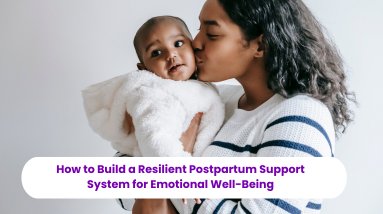Do you feel emotionally unstable after childbirth? However, bringing a baby into the world is a beautiful experience.
From sleepless nights to trying to remember when you last washed your hair, the postpartum period can drain you, both physically and emotionally.
This is where having a solid support system comes into play, and trust me, it’s more important to build a positive self-image and practice self-care, which can lead to being emotionally stable.
Let’s talk about how to build a postpartum support system that doesn’t just help you survive but also helps your emotional stability.
1. Understand What You’re Going Through
After giving birth, the responsiveness of your hormones changes, which can cause you to be emotionally anxious. This is normal and can cause mood swings, sadness, and worry. It’s important to recognize and accept these feelings as the first step in getting the emotional support you need to feel better.

Involve Key People in to support in building your emotional well-being after birthday
- Family: Whether it’s your partner, mom, or sister, let them know what you need. Don’t expect them to guess, and be clear about how they can help you.
- Friends: Chat with friends and talk to other moms who have gone through what you’re going through before. They’ll listen to you vent about how the baby won’t nap and might even show up with snacks!
- Professionals: Talk to a therapist or counselor who specializes in postpartum care. This can help if you’re feeling extra tired.
2. Create a Postpartum Plan
Think of the postpartum period like a big project; having a plan can make things easier. While you don’t need to organize every detail, setting up a basic support system can help you feel more prepared and reduce stress as you settle into life with a newborn. Here are a few areas to focus on:
Delegate Tasks
After giving birth, trying to handle everything on your own can quickly become overwhelming. Before the baby arrives, talk to your partner, family, or friends about ways they can help.
Ask someone to cook a few meals, do the grocery shopping, or tackle laundry for you. If someone offers to help, don’t be afraid to accept!
Create a schedule
You might even create a schedule so that support is steady and doesn’t fall entirely on one person. Having others pitch in will allow you to rest and focus on bonding with your baby
3. Use Professional Resources

There are professionals out there whose entire job is to help you through this time. Pretty great, right? They’re trained to guide you, answer questions, and provide personalized support. These experts can be invaluable resources during the postpartum period, helping you navigate the unique challenges of new motherhood.
Lactation Consultants: If breastfeeding feels confusing or frustrating, reach out for help. These specialists have extensive knowledge about breastfeeding techniques and can assist with positioning, latch issues, and milk supply.
Postpartum Doulas: These amazing people offer both emotional and practical support after the baby is born. Postpartum experts in counselling can help with everything from newborn care and light housework to guiding you through recovery and self-care. They provide a listening ear and a calming presence, making the transition into motherhood smoother and less overwhelming
4. Speak Up About Your Needs
You don’t have to do everything on your own. And you don’t have to pretend you’ve got it all figured out. Being honest about what you’re feeling can help get you the support you need.
- With Your Partner: Regularly check in with each other. Talk about what you’re struggling with and encourage them to share too.
- With Family: It’s okay to say, “I’m feeling overwhelmed and need help.” There’s no medal for doing it all alone!
5. Don’t Forget About Self-Care
It’s easy to put yourself last, but even small acts of self-care can make a big difference in your mood.
- Move Your Body: Light exercise like walking can lift your spirits.
- Quiet Time: Take a few minutes to meditate, breathe deeply, or sip a cup of tea without interruptions. Even short breaks can help recharge you.
Final Thoughts
Building a strong postpartum support system isn’t about doing everything on your own. It’s about asking for help when you need it, leaning on your support network, and taking care of your emotional well-being.
Surround yourself with people who care, make a plan, and remember you’ve got this, even when it feels tough!


